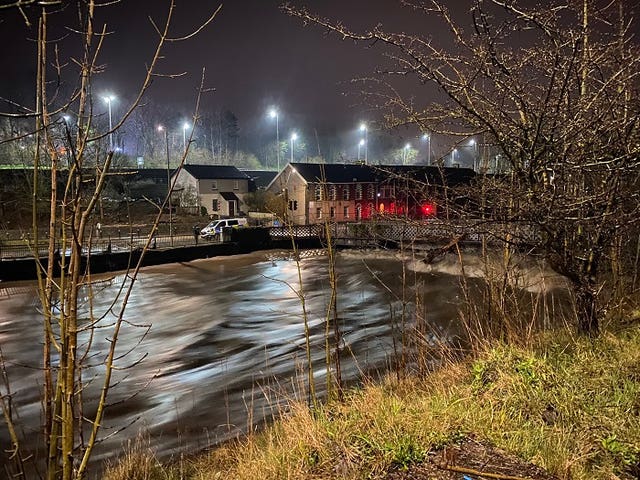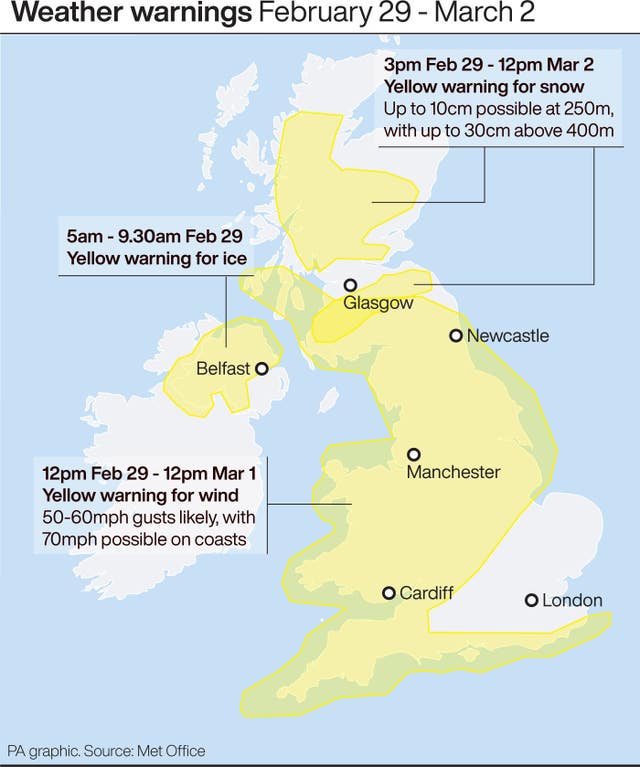Storm Jorge has heralded its arrival with heavy rain and strong gales as Britain endures its fourth weekend of severe weather. Boris Johnson has been widely criticised for his absence amid ongoing floods and continued weather chaos.
This month’s third named storm is bringing rain, gales and snow, prompting weather warnings stretching from Cornwall to the north of Scotland and across to Northern Ireland.
Police in flood-hit South Wales declared a temporary “critical incident” on Saturday morning as emergency services, councils and other bodies worked to protect property and infrastructure and protect residents.
People in Pontypridd, which was also flooded two weeks ago, and the Ely area of Cardiff, were advised to remain indoors amid warnings of further rising water levels and gusts of up to 70mph.

People took to social media to criticise Boris Johnson’s absence amid the ongoing chaos:
This is the ferocious storm Jorge, 3rd in so many weeks, pummeling the UK. There'll be more floods as the saturated ground will run off into tributaries into the main rivers bursting their banks. Will Boris Johnson visit those who elected him into office? https://t.co/gBn52kQF5K pic.twitter.com/W1IKyx9evo
— Jane Samuels (@Jane_Samuels) February 29, 2020
https://twitter.com/xAmelieMayx/status/1233679247677566976
In the last 10 days Coronavirus has hit every continent bar Antarctica
The FTSE has tanked
A fourth storm Jorge hit 🇬🇧
Boris Johnson is AWOL
And the racist 🇬🇧 establishment including @BBCNews @bbclaurak are engaged in helping fellow toff Sir Philip Rutnam end Priti Patel https://t.co/2NctzwW4iX
— Navdeep Singh Rajwanshi (@TheGameVeda) February 29, 2020
So, Boris Johnson's AWOL during unprecedented floods, coronavirus, collapsing Brexit, stockmarket meltdown, senior Civil Service resignations etc.
What will it take to flush him out of hiding? Asteroid strike? ☄️ Zombie Apocalypse? Blonde American in need of tech funding?
— Edwin Hayward (@edwinhayward) February 29, 2020
Cardiff Council said emergency teams worked through the night on flood defences, road closures and clearing debris to limit the damage from torrential rains as its roads team answered around 100 incidents.
More than 600 homes and a similar number of businesses have been hit in Wales, accounting for around a quarter of affected properties in the UK.
England has had more than 200% of its average February rainfall, according to the Environment Agency, with some areas getting a month’s worth in 24 hours.
There were six yellow weather warnings for rain, wind and snow in force across the country on 29 February, stretching from Cornwall to the north of Scotland and across to Northern Ireland.

The rain warning was lifted before midday as showers eased but alerts remained in place for gales and the potential for power cuts, transport delays and large waves for coastal communities.
The wind warnings last until 9am on 1 March across much of England and Wales and until 3pm the same day across Northern Ireland, southern Scotland, and northern England.
Persistent snowfall was forecast over higher parts of Scotland, with up to 30cm predicted in some places, with warnings in place until noon on Monday, the Met Office said.
A total of 83 flood warnings were in place across England and Wales, mostly in the South West and along the English-Welsh border, and in Yorkshire, while a further 211 “flooding is possible” alerts are also in force.
Have #SaturdayAfternoon plans? Bright for many but very windy. Some #snow showers too, especially across the north
Stay #WeatherAware ⚠️ pic.twitter.com/VnVmOOEA3O
— Met Office (@metoffice) February 29, 2020
The wind-chill factor will make temperatures feel close to freezing, said the Met Office.
Heavy rain which started with Storm Ciara continued with Storm Dennis and now Jorge has contributed to record river levels which have seen safety teams put in “Herculean efforts” to erect flood defences.
Towns including Ironbridge and Bewdley along the River Severn in the West Midlands, and West Cowick and Lidgate in East Yorkshire, along the River Aire, are among the worst-hit areas in England.
The Environment Agency said 1,000 staff per day have worked on flood defences and pumps, clearing debris and repairing damaged defences, erecting 3.7 miles of barriers.
The body warned the country needs to brace itself for “more frequent periods of extreme weather like this” because of the climate crisis.
















